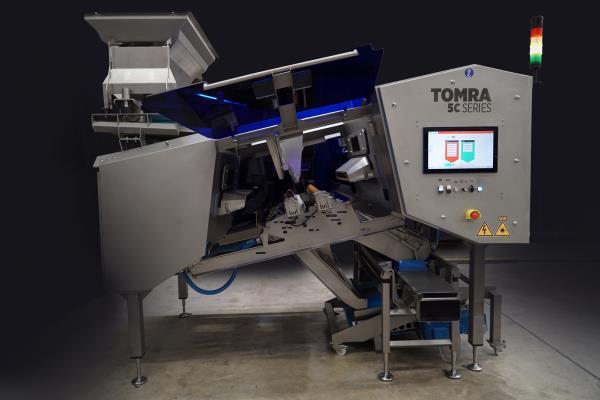Gürsoy utilizes TOMRA 5C for sorting hazelnuts for the first time
VU
Since 1933, Gürsoy has been producing and selling hazelnuts and today it is one of Turkey's main hazelnut exporters. With its 3 facilities in Ordu on the Black Sea coast, Gürsoy is known in international markets as one of the most important hazelnut producers in its region.
Gürsoy exports natural and processed hazelnut products to large industrial companies in 32 countries worldwide.
To ensure that the quality meets customers' demands, the company keeps investing in its facilities. It has chosen the new TOMRA 5C optical sorter to further increase its product quality. Gürsoy is the first company in Turkey to use this machine for processing hazelnuts.
Gürsoy has been utilizing TOMRA machines since the early 2000s. Today, 6 TOMRA machines are operating on the production lines of its 3 facilities in Ordu.
Dursun Oğuz Gürsoy, Chairman of Gürsoy, commented that their sales volume ranges from 10,000 to 14,000 tons of hazelnut kernels, even though production volume varies from year to year due to yield and export conditions. This capacity was achieved thanks to the advantages of the TOMRA machines, which are usually on the natural hazelnut line, because if the raw material was sorted well, there is no need to sort it again after processing. They also have TOMRA optical sorters on the processed hazelnut lines. After over 20 years of successful partnership with TOMRA, Gürsoy decided to invest in their newest machines and utilize the TOMRA 5C for the first time for sorting hazelnuts.
Dursun Gürsoy said that Turkey exports hazelnuts mainly to Germany, Italy, France, Poland and Austria. To meet the high expectations of these markets, they manage the production process thoroughly. Therefore, the investments in automation become more significant. Achieving higher quality products with TOMRA's solutions adds value to their processing operations. On the other hand, optical sorters lower operational costs. Firstly the reduction in labor costs, then the benefits of high sorting capacities, and the ease of sorting the defects that cannot be detected by a human eye.
In regards to exporting, Gürsoy commented that Turkey supplies 65-70% of hazelnuts worldwide annually. Although Italy, the US, Georgia, Azerbaijan, Spain, and Chile are also leading producers, Turkey leads the industry in terms of quality and volume.
In 2020, Turkey exported 280,924 tons of hazelnut kernels ($1.9 billion). Year-on-year hazelnut exports dropped by 12 percent and year-on-year foreign currency exports by 4 percent due to the decline in export markets caused by the pandemic. The pandemic has damaged the Turkish market harder, with demand declining by 15%. However, in 2021, the strict measures and vaccination campaigns in the European countries will positively influence the markets for the period between June and December, which will boost the positive trend in consumption. This is why hazelnut producers should keep investing in their facilities, according to Gürsoy.
The pandemic has highlighted again the importance of optical sorting and automation solutions in the food industry. The rapid rise of labor costs, the added costs of the measures necessary to protect employees in and out of the plant, as well as the costs derived from the loss of labor, are all factors that show the importance of mechanization and automation.
According to Gürsoy, Turkey started using optical sorting solutions around 10-15 years ago, but the use of these machines is still not sufficient. The rapid rise in financing costs makes it impossible for small- and mid-sized entities to invest. Large-scale entities seek to equip their facilities with optical sorting solutions according to their financial capabilities. However, the high finance charges and the decreasing trend of profit margins due to high competition in the hazelnut sector are slowing down investments in optical sorters. The percentage of optical sorting systems in small- and medium-sized companies is lower than 5%, and despite widespread use of these systems in large-sized companies, it is still lower than 50 percent. As Gürsoy said, the negative effects of this pandemic might boost decisions to invest.
TOMRA machines have dramatically decreased the number of complaints about foreign materials. The chairman added that while reducing labor costs, they increased their production capacity. Also, efficient maintenance service, spare part service, and high machine performance are the key advantages of TOMRA.
Gürsoy scrupulously analyzed different optical sorter solutions before acquiring TOMRA 5C. The main factors in choosing this machine were its sorting performance, capacity, and ability to determine the defects which other machines would miss.
Ahmet Koçyiğit, TOMRA Food Turkey Sales Manager, said that TOMRA 5C combines industry-leading sensors with machine learning and big-data analysis to guarantee the most accurate foreign material removal possible. High-resolution lasers and the latest generation sensors enable it to detect and analyze the smallest defects.





